

#INTHEAIREVERYWHERE
| |
 |
 #INTHEAIREVERYWHERE |
| Vol. 22 No. 11 | Tuesday
March 28,
2023 |
| |
Navigating The Uncertainties Of Our Times |
Here I am in Chambery, writing at a desk conveniently provided by the railways. SNCF being on strike, there was just one train leaving Geneva to Chambery in France today, so that I could board my Frecciarossa to Turin. Hence, I had to leave my meetings at the FIATA Headquarters’ (HQ) too early and arrived in Chambery four and a half hours ahead of my schedule, but my harvest is ripe and even abundant nonetheless. Chambery station has a cosy, well equipped upstairs space where all travellers can sit, relax or work for free. A piano plays soft music in the distance and thoughts emerge, induced by the call of spring. I was considering how much my environment has changed in the 50+ years I have travelled for and worked in logistics. From my thin laptop, connected through my smartphone to the Internet, I have the world at my fingertips. I send my photos and my draft article to Geoffrey in New York at the blink of an eye. None of this existed in 1972 as most of today’s technology has been created in the last two or three decades. In Geneva, more than ever a place of crucial importance represented by the United Nations’ hard gained balance of powers, this spirit is perceptible throughout the wonderful UN buildings and gardens, which have been aptly included in the HQ programme as a side excursion for delegates’ accompanying persons. The FIATA Headquarters’ session, the traditional FIATA Members’ gathering in the springtime, now held on the shores of the Leman, attains a new, more suitable environment. FIATA is the epitome of international business and Geneva represents the very essence of internationality, which is everywhere around you and you get unwittingly absorbed. This year’s FIATA HQ was a very good meeting and everybody went out of their way to please one another. Good to be back together, I have the impression everyone enjoyed the atmosphere, starting with the staff and the DG, all more confident and relaxed than last year, when we were just coming out of our dark COVID prisons. It may seem unorthodox to start this article by taking an abrupt sharp turn, but the IPCC just published their report on climate change, which UN Secretary Gutierrez called “a survival guide for humanity”. Put it in a straightforward manner: if nothing is done, our future lives will not last very long. Unsurprisingly, the Brits excelling in journalism, I chose to quote the BBC information as being the best, timely and articulate. Why am I saying this? From the station I can see a strange warm haze, no trace of the snow that would still be piling up outside 50 years ago. Today is the first day of spring, but the atmosphere seems a bit grey; the landscape on the way from Geneva was scattered with beautiful, yet rare, flowers and sprouts, notwithstanding a warmer than usual winter. A bad and seemingly intractable drought is withering the Alpine bloom for the second year in a row. 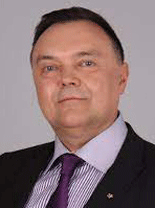 Needless
to say environmental issues have occupied the deliberations at the HQ, as
FIATA members seem to become more and more aware of their role in finding
solutions, not as secondary as it might appear at first sight. Emissions
and climate change have not only been part of the official debates. They
have been hitting dinners, coffee breaks and almost any other social activity
I was involved in. In fact, President Ivan Petrov opened the four-day event
with a presentation that contained the main elements of today’s FIATA
policy after FIATA’s Reset Programme: the optimisation of multi-modal
corridors through improved capacity building, strong support of digitisation
in logistics and extensive adoption of the electronic FIATA Bill of lading,
addressing the issues of cybersecurity and safety, as well as continuous
attention to the much esteemed FIATA vocational training programmes. As
expected, the implementation of the UN Sustainable Development Goals managed
to get central in FIATA’s agenda. President Petrov’s well-informed
presentation sounded almost as a SWOT analysis of our troubled times: freight
volatility, combined with reduced competition ignited by the vertical integration
of businesses, inflation and interest rates cutting international trade
space, etc. but FIATA is “en route” to new highs, new services
for members, renewed priorities for the various FIATA bodies, a renewed
approach to multimodal corridors and the geopolitical challenges of the
current times. Members in attendance were then asked to reflect on the business
climate through a poll. Needless
to say environmental issues have occupied the deliberations at the HQ, as
FIATA members seem to become more and more aware of their role in finding
solutions, not as secondary as it might appear at first sight. Emissions
and climate change have not only been part of the official debates. They
have been hitting dinners, coffee breaks and almost any other social activity
I was involved in. In fact, President Ivan Petrov opened the four-day event
with a presentation that contained the main elements of today’s FIATA
policy after FIATA’s Reset Programme: the optimisation of multi-modal
corridors through improved capacity building, strong support of digitisation
in logistics and extensive adoption of the electronic FIATA Bill of lading,
addressing the issues of cybersecurity and safety, as well as continuous
attention to the much esteemed FIATA vocational training programmes. As
expected, the implementation of the UN Sustainable Development Goals managed
to get central in FIATA’s agenda. President Petrov’s well-informed
presentation sounded almost as a SWOT analysis of our troubled times: freight
volatility, combined with reduced competition ignited by the vertical integration
of businesses, inflation and interest rates cutting international trade
space, etc. but FIATA is “en route” to new highs, new services
for members, renewed priorities for the various FIATA bodies, a renewed
approach to multimodal corridors and the geopolitical challenges of the
current times. Members in attendance were then asked to reflect on the business
climate through a poll. 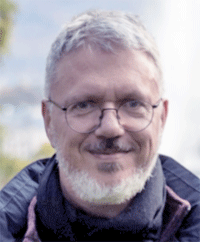 After
the opening remarks, our friend Jan Hoffman, Head Trade Logistics Brach,
UNCTAD, took the floor and gave his key-note presentation, which provided
FIATA members with an up-to-date outlook of the trade and shipping landscape.
Much of the data presented is contained in UNCTAD’s REVIEW OF MARITIME
TRANSPORT but listening to it with the right audience makes a lot of sense.
Explaining the uncertainties that we lived before, during and just after
the pandemic was necessary to interpret the trends of our immediate future.
In good substance the pre-pandemic conditions of continuous growth, with
a certain containment of supply, determined the explosion of transport costs,
which was rapidly followed by an almost identical decline. Jan’s high
level economic analysis further explained, through the so called “nowcasts”,
the elements we are supposed to factor in our immediate future. Alongside
recognised reasons for pessimism (war, inflation, volatility, etc.) the
reasons for optimisms (growth and demand, both stronger than earlier expected,
modernisations adopted during the pandemic, China re-opening) allowed Jan
Hoffmann to conclude his speech with a rather auspicious exhortation: resisting
change and innovation is costlier in the long run than embracing it. A statement
that came forward in other workshops during the HQ and was echoed by many
other speakers. After
the opening remarks, our friend Jan Hoffman, Head Trade Logistics Brach,
UNCTAD, took the floor and gave his key-note presentation, which provided
FIATA members with an up-to-date outlook of the trade and shipping landscape.
Much of the data presented is contained in UNCTAD’s REVIEW OF MARITIME
TRANSPORT but listening to it with the right audience makes a lot of sense.
Explaining the uncertainties that we lived before, during and just after
the pandemic was necessary to interpret the trends of our immediate future.
In good substance the pre-pandemic conditions of continuous growth, with
a certain containment of supply, determined the explosion of transport costs,
which was rapidly followed by an almost identical decline. Jan’s high
level economic analysis further explained, through the so called “nowcasts”,
the elements we are supposed to factor in our immediate future. Alongside
recognised reasons for pessimism (war, inflation, volatility, etc.) the
reasons for optimisms (growth and demand, both stronger than earlier expected,
modernisations adopted during the pandemic, China re-opening) allowed Jan
Hoffmann to conclude his speech with a rather auspicious exhortation: resisting
change and innovation is costlier in the long run than embracing it. A statement
that came forward in other workshops during the HQ and was echoed by many
other speakers. Jan Hoffman also informed us that, against a certain scepticism, two years ago UNCTAD predicted that prices would grow due to higher logistic costs: the IMF then measured that 1.5% of the increase was due to transport prices soaring. Another point of interest: in reply to a question from Ukraine the speaker reminded the audience of UNCTAD’s hard work to prepare the UN grain agreement and said that UN Secretary Gutierrez based himself on the data provided by UNCTAD, in particular with regard to alternative ways to transport grains when there are no ships available. Hoffmann also invited interested parties to participate in 2024 Global Supply Chain Forum. The President then closed the opening by inaugurating the HQ exhibition with the other Members of the Presidency and the Director.
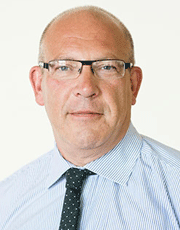 In
the afternoon Mark Bromley, chairman of the MTI, (Multimodal Transport Institute)
welcomed the delegates in attendance by giving a comprehensive account of
MTI’s recent activities (inter alia, progress made on eCMR). The MTI
then split in different sessions. The shortage of drivers was one of the
issues emerging from the debate, but there are areas in the world where
no shortage of drivers exists, e.g. Africa and India. but this cannot help
Europe without appropriate measures of adaptation. The Rail sector also
suffers from a similar shortage. Another session concluded that the Trans
Caspian corridor lost part of its appeal when sea freight rates started
to tumble in recent times. In
the afternoon Mark Bromley, chairman of the MTI, (Multimodal Transport Institute)
welcomed the delegates in attendance by giving a comprehensive account of
MTI’s recent activities (inter alia, progress made on eCMR). The MTI
then split in different sessions. The shortage of drivers was one of the
issues emerging from the debate, but there are areas in the world where
no shortage of drivers exists, e.g. Africa and India. but this cannot help
Europe without appropriate measures of adaptation. The Rail sector also
suffers from a similar shortage. Another session concluded that the Trans
Caspian corridor lost part of its appeal when sea freight rates started
to tumble in recent times. If you look at the FIATA HQ as a music LP, containing several songs with different rhythms, the afternoon being the B-side, after the coffee break FIATA gave us a bonus track: the workshop 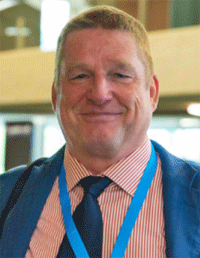 “SUSTAINABILITY
AT WHICH COST”, which came as an eye opener for many of those in the
attendance. Jens Roemer, (right) Chairman of the Working Group
Sea and Senior Vice President, paid a tribute to all staff employed in transport
logistics, who contributed to minimise the distress caused by the pandemic.
“Human resources are our strength” was the statement that concluded
SVP Roemer’s introduction. Then sustainability took control. “SUSTAINABILITY
AT WHICH COST”, which came as an eye opener for many of those in the
attendance. Jens Roemer, (right) Chairman of the Working Group
Sea and Senior Vice President, paid a tribute to all staff employed in transport
logistics, who contributed to minimise the distress caused by the pandemic.
“Human resources are our strength” was the statement that concluded
SVP Roemer’s introduction. Then sustainability took control. Pedro Nonay, ex-CEO and consultant in Commodity Trading, James Corbett, Environmental Director Europe, WSC (World Shipping Council), Tyler Baron CEO at Minerva Bunkering, SVP Jens Roemer and Ms. Andrea Tang, who appears to effortlessly handle, on behalf of the FIATA secretariat, the enormous agendas of the Airfreight and Multimodal Transport Institutes, created an unbiased and informative debate about sustainability’s teething issues. Let me take a record of some notable statements: - (Nonay) With bioethanol and bio diesel, we know investment is needed, but it is difficult to raise the necessary investment. The market was dysfunctional with 1st generation biofuels. Using crops for fuel is hardly a solution as 15% of crops replace only 1% of fossil fuels; - (Corbett) 1/3 of new ships’ investments is made in dual fuel technology. The maritime sector is moving from being a price-avoider to a leading renewables user, moving from the cheapest to the most expensive fuel and this is a 100 years’ paradigm shift, committed to enacting the EU circular economy policies. This is policy driven innovation. On certain conditions the EU could become the premier provider of bio-fuels in the world; as we have seen delaying transition is costlier than embracing it. Future ready ships will be 2/3 of the supply in future, on full life cycle basis. Jens Roemer closed the first round by saying he was in heaven listening to these statements. He admitted that we are all just out of tough period, sustainability is still not so high on the agendas and we could sit back and wait, as business is price sensitive. But the world is watching: “my daughter would kill me if I do not do anything”, he passionately concluded. However, “we do not need just another surcharge that would be impossible to understand. In EU we have the ETF (incorporating the maritime in 2024) and this should change the scene.” Maybe there is a role for FIATA in trading carbon credits… Dr Corbett noted that in 2027 regulations will phase in, affecting all the fleets.
In the second round Tyler Baron said that at the moment bio fuel counts for 1% of all bunker value, James Corbett affirmed his sector was not looking at a surcharge: there is a shift in the business, 2, 3 or even 5 times as costly, but with a different paradigm. Pedro Nonay established that resistance to change is the enemy of the future. Jens Roemer decried that certain choices could put clean vessels on certain markets and “dirty” vessels on others, but James Corbett said that we need to drive these fuels to all market levels as quickly as possible. Nearly 1⁄4 of fuel is sold in Singapore and they understand that this transition needs to happen. ISO14083 will tell us how emissions will be measured. Admittedly, the issue is, EU succeeding in its policy, older ships will service other areas and that will hurt certain communities that customers need to serve. All made a pause to watch the result of the poll: Dr. Corbett made his comment: the NO answer really means “not yet”, there is no other choice . . . Jens Roemer concurred to be surprised by the reply, as FIATA had been talking about this issue for a long time and solutions to include this opportunity exist on the market. In closing the Chairman asked for one key takeaway in conclusion and started by saying it was high time we shook up . . . “All items in sustainability are as important now as the pandemic was before, maybe more” he acknowledged. James Corbett stated that shared customers’ demand lead to progress and there is value added in finding a way forward. We have the chance to turn challenges into opportunities by working with FIATA. Pedro Nonay stated that we are navigating through asymmetries. A warm round of applause concluded the eventful session and the long day of debates. From the audience the impression is that sustainability has landed onto the policy agenda of the freight forwarding sector and is set to take the front row in the business decisions in the next few years. FIATA has proved one more time to be the representative body of the sector by drawing members’ attention to the urgency of the problem. Let me also borrow Jan Hoffman’s statement to conclude this long account: resisting change will not only be short-sighted, it will be enormously costly and this is a language the good entrepreneur should understand without any doubt, regardless of the sector it comes from. I shall tell you more about the deliberations in future articles and remind you that FIATA will hold its next World Congress in Brussels in October. Marco L. Sorgetti Chambery, March 21st 2023 |
If
You Missed Any Of The Previous 3 Issues Of FlyingTypers Access complete issue by clicking on issue icon or Access specific articles by clicking on article title |
||
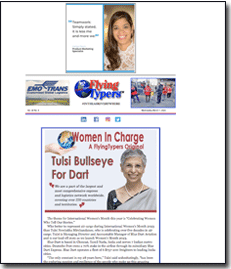 Vol. 22 No. 8 Tulsi Mirchandaney Chuckles for March 1, 2023 ATC Africa Campbell Loves the Maharajah The AI Maharajah Men Mountain Smiths 2.0 A Custom Broker's Custom Broker |
 Vol. 22 No. 9 On The Mark@Intermodal Banker's Miserable Numbers Qatar Cargo Once-A-Day First United Cargo Annual Meet Sheryle 'Cheese' Burger Lens Of Love Cathay Pacific Cargo now Cathay Cargo |
|
Publisher-Geoffrey Arend
• Managing Editor-Flossie Arend • Editor Emeritus-Richard
Malkin Film Editor-Ralph Arend • Special Assignments-Sabiha Arend, Emily Arend |
Send comments and news to geoffrey@aircargonews.com
|